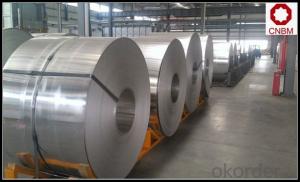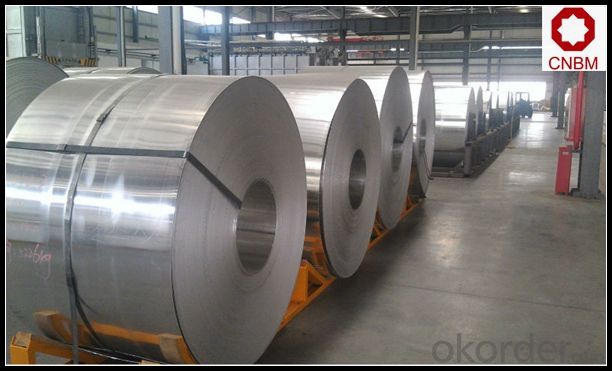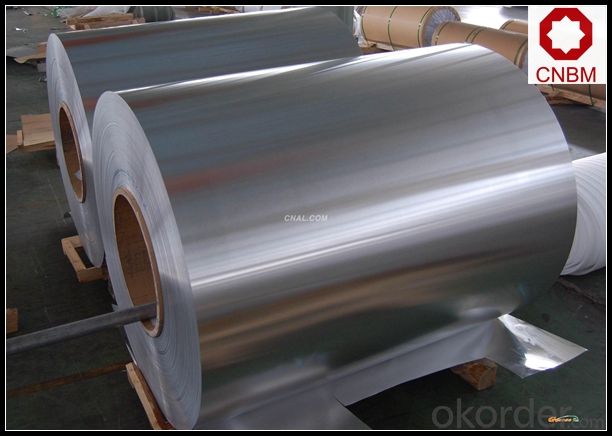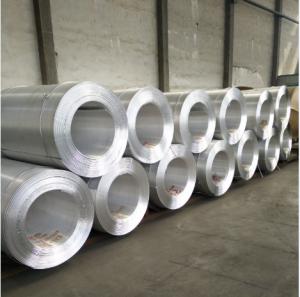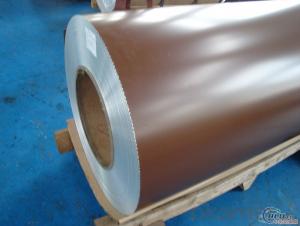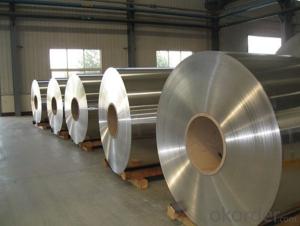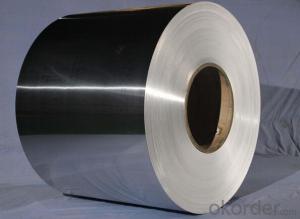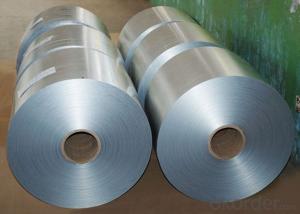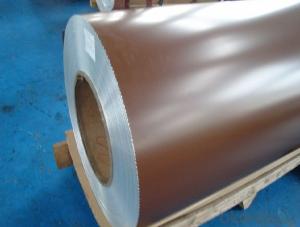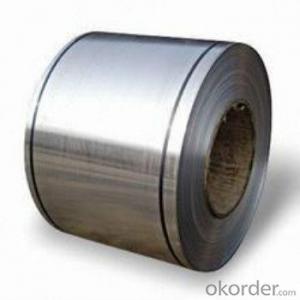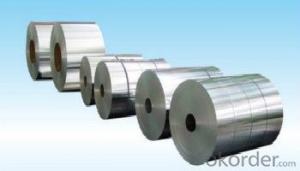Aluminum Steel Coil - Mill Finish Aluminum Coils 3003 H14 H24 Factory Selling
- Loading Port:
- Shanghai
- Payment Terms:
- TT OR LC
- Min Order Qty:
- 5 m.t.
- Supply Capability:
- 10000 m.t./month
OKorder Service Pledge
OKorder Financial Service
You Might Also Like
Specification
1. Specification of Mill Finish Aluminum Coils 3003 H14 H24 Factory Selling
Alloy: 1050, 1060, 1100, 3003, 3004, 3005, 3105, 5005, 5052, 5083, 5754
2) Temper: Various status
3) Thickness: 0.3-150mm
4) Width: 300-1950mm
5) Length: Under9500mm/ Coil
6) Weight: 2.5-5.0 tons per coil
7) Dimensions and weight can be produced according to clients' specifications.
8) Inner Diameter: 505mm, 605mm
9) Packing: Export standard, wooden pallet.
10) Delivery time: 20 days
11) Minimum order quantity: 5 tons per size.
12) The term of payment: T/T, irrevocable L/C at sight.
13) Surface: Bright
14)Origin: China
2. Application of Mill Finish Aluminum Coils 3003 H14 H24 Factory Selling
(1).Interior: wall cladding, ceilings, bathrooms, kitchens and balconies, shutters, doors...
(2).Exterior: wall cladding, facades, roofing, canopies, tunnels,column covers , renovations...
(3).Advertisement: display platforms, signboards, fascia, shop fronts...
3. Feature of Mill Finish Aluminum Coils 3003 H14 H24 Factory Selling
*Such coil is specially designed to replace aluminum ingot, due to the high export tax of aluminum ingot, the coil has better price than ingot.
*This type of coil can fit customer's remelting furnace just like ingot, no need to make any change to the production line that was previously used for ingot. The standard coil size and weight is very suitable for the feed gate of furnace.
*This type of coil causes less material wastage than ingot when remelted.
*Our coil is made directly from ore, no need to go though the ingot making process, quality is much better than other suppliers who use ingot scrap to make coil.
Be free from Oil Stain, Dent, Inclusion, Scratches, Stain, Oxide Dicoloration, Breaks, Corrosion, Roll Marks, Dirt Streaks and other defect which will interfere with use
4. Certificate:
SGS and ROHS(if client request, paid by client), MTC(plant provided), Certificate of Origin(FORM A, FORM E, CO), Bureau Veritas and SGS (if client request, paid by client), CIQS certificate
5. Image of Mill Finish Aluminum Coils 3003 H14 H24 Factory Selling
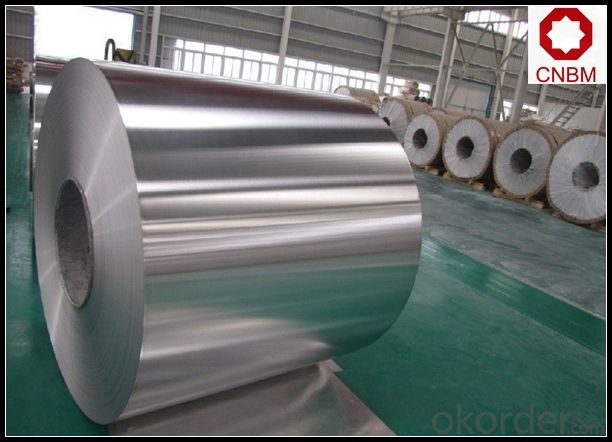
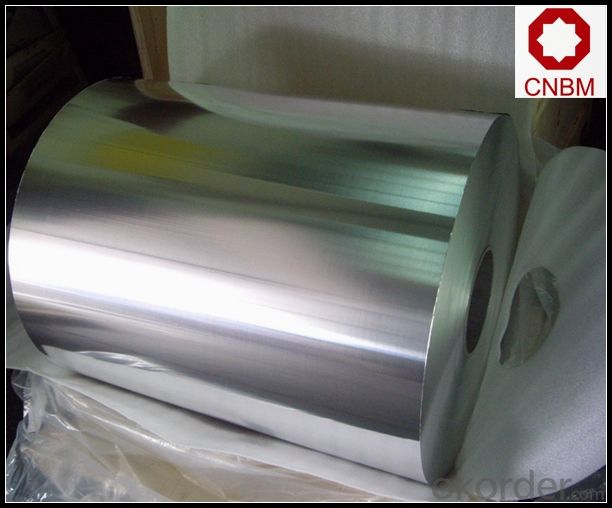
6. Package and shipping of Mill Finish Aluminum Coils 3003 H14 H24 Factory Selling
eye to wall
eye to the wall
with wood pallet (wooded case also available)
7. FAQ
1) What is the delivery time?
Dpends on actual order, around 20 to 35 days
2)What is the QC system:
We have QC staff of 20 persons and advanced equipment, each production is with MTC traced from Aluminum ingot lot.
3) What market do you mainly sell to?
Australia, America, Asia, Middle East, Western Europe, Africa etc
- Q: What are the potential applications of coil-anodized aluminum coils?
- Coil-anodized aluminum coils have a wide range of potential applications due to their durability, versatility, and aesthetic appeal. Some of the common applications include architectural cladding, roofing, signage, facade panels, interior decoration, automotive trim, and electronics casings. The anodized coating provides enhanced corrosion resistance, weatherability, and color stability, making it suitable for both indoor and outdoor use. Additionally, the ability to create various finishes and textures further expands the possibilities for using coil-anodized aluminum coils in different industries.
- Q: Are there any limitations on the surface treatment of aluminum coils?
- The surface treatment of aluminum coils has certain limitations. One limitation pertains to the type of surface treatment suitable for aluminum coils. Anodizing, painting, and powder coating are some options for surface finishes. However, not all treatments are suitable for every application. For instance, anodizing is a durable and corrosion-resistant finish but may not meet the requirements of applications that demand specific colors or designs. Similarly, painting and powder coating offer a wide range of colors and aesthetics but may not match the durability of anodizing. Another limitation concerns the size and shape of the aluminum coils. Surface treatment processes have size and shape restrictions for aluminum coils. For example, anodizing is typically performed in tanks or racks, which may have size limitations. Similarly, painting and powder coating processes may require specific equipment or facilities that cannot accommodate large or irregularly shaped coils. Furthermore, the condition of the aluminum surface affects the effectiveness of the surface treatment. Imperfections or surface defects on aluminum coils can impact the adhesion and durability of the treatment. Proper cleaning and preparation of the aluminum surface are crucial to ensure the effectiveness of the surface treatment. In conclusion, while there are various surface treatments available for aluminum coils, limitations exist regarding the type of treatment, the size and shape of the coils, and the condition of the aluminum surface. It is important to consider these limitations and select the most suitable surface treatment based on the specific requirements and constraints of the application.
- Q: Can aluminum coils be used for architectural facades?
- Yes, aluminum coils can be used for architectural facades. Aluminum is a popular choice for architectural facades due to its lightweight nature, durability, and versatility. Aluminum coils can be easily formed into various shapes and sizes to create innovative and visually appealing facades. The material is resistant to corrosion, making it suitable for outdoor applications. Additionally, aluminum can be easily coated or finished to enhance its aesthetic appeal and protect it from environmental elements. Overall, aluminum coils offer a cost-effective and sustainable solution for architectural facades.
- Q: Is it possible to utilize a punching machine to create holes in steel coils for decorative purposes?
- <p>Yes, you can use a punching machine to punch holes in steel coils for decoration purposes. Punching machines are designed to create precise holes in various materials, including steel. For steel coils, ensure the machine is capable of handling the thickness and hardness of the steel. It's important to select the right punch and die material, and consider the coil's strength and ductility. Always follow safety guidelines and machine specifications to prevent damage or injury.</p>
- Q: Are there any limitations on the bending or forming of aluminum coils?
- Yes, there are limitations on the bending or forming of aluminum coils. Aluminum, although a relatively malleable metal, does have certain limitations when it comes to bending or forming. One limitation is the formation of cracks or fractures during the bending process. Aluminum has a lower ductility compared to other metals, meaning it has a tendency to crack or break when subjected to excessive stress or strain. Therefore, it is important to carefully control the bending process to avoid over-stressing the aluminum coils and causing damage. Another limitation is the spring-back effect. When aluminum is bent or formed, it has a natural tendency to spring back slightly towards its original shape. This can make it challenging to achieve precise and accurate bends or forms, especially when dealing with complex shapes or tight tolerances. Additionally, the thickness and grade of the aluminum can also affect its bendability. Thicker aluminum coils may require more force or specialized equipment to bend, while certain aluminum alloys may have different mechanical properties that influence their formability. To mitigate these limitations, various techniques and tools can be used. For example, using specialized bending equipment, such as press brakes or roll forming machines, can help control the bending process and minimize the risk of cracking or spring-back. Additionally, preheating the aluminum coils can improve their ductility and make them more pliable for bending or forming. It is important to consider these limitations and work within the defined parameters to ensure successful bending or forming of aluminum coils. Consulting with experts or manufacturers familiar with aluminum processing can provide valuable guidance and assistance in overcoming these limitations effectively.
- Q: Can aluminum coils be used in the manufacturing of lighting fixtures?
- Yes, aluminum coils can be used in the manufacturing of lighting fixtures. Aluminum is a lightweight and durable material that is commonly used in various industries, including the lighting industry. It offers excellent heat dissipation properties, making it suitable for fixtures that generate heat, such as LED lights. Additionally, aluminum coils can be easily shaped and molded into different designs, making them a versatile choice for lighting fixture production.
- Q: How are aluminum coils transported and packaged?
- Aluminum coils are typically transported and packaged using wooden crates or pallets. The coils are securely strapped or bundled together to prevent movement during transit. They are then loaded onto trucks or shipping containers for transportation, ensuring they are well-protected to avoid any damage or deformation.
- Q: This question asks for criteria or methods to determine if an aluminum coil is of high quality.
- <p>To identify a good quality aluminum coil, consider the following factors: purity indicated by the alloy number, surface finish which should be smooth and free from defects, thickness consistency, and mechanical properties such as tensile strength and elongation. Check for certifications or quality standards compliance. Look for uniform color and absence of oil stains or rust. The coil should have precise dimensions and be free from dents or scratches. Additionally, consider the supplier's reputation and customer reviews.</p>
- Q: What are the different width tolerances for aluminum coils?
- The different width tolerances for aluminum coils can vary depending on the specific industry and application. However, common width tolerances for aluminum coils range from +/- 0.005 inches to +/- 0.030 inches.
- Q: Are aluminum coils suitable for high-pressure applications?
- No, aluminum coils are not suitable for high-pressure applications.
Send your message to us
Aluminum Steel Coil - Mill Finish Aluminum Coils 3003 H14 H24 Factory Selling
- Loading Port:
- Shanghai
- Payment Terms:
- TT OR LC
- Min Order Qty:
- 5 m.t.
- Supply Capability:
- 10000 m.t./month
OKorder Service Pledge
OKorder Financial Service
Similar products
Hot products
Hot Searches
Related keywords
